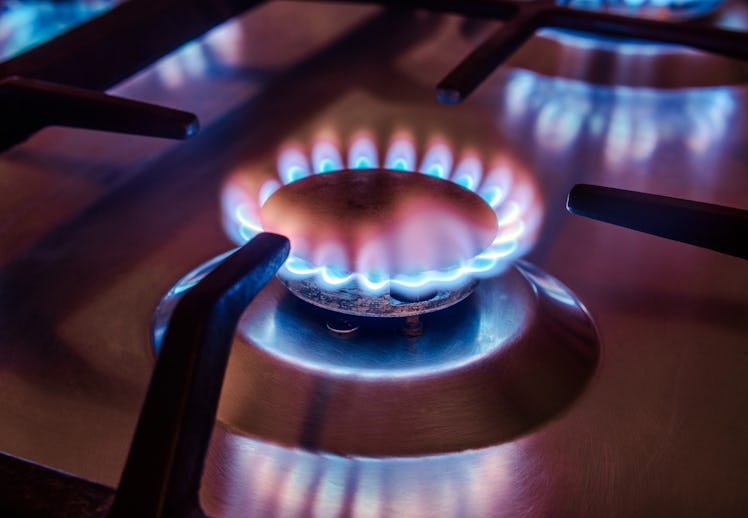Gas Stoves Leak Dangerous Benzene, Study Says, But You Can Reduce Your Exposure
And you don't have to spend thousands of dollars to do so — yet.

New research has found that natural gas stoves leak harmful chemicals, even when turned off. The study, published yesterday in the journal Environmental Science & Technology, confirmed previous findings that the fuel used to power gas ovens, stoves, ranges, and water heaters contains dangerous contaminants that have adverse health effects for adults and kids.
Building on previous research from Stanford and Harvard, a team of scientists from PSE Healthy Energy, a nonprofit energy research firm, analyzed 185 individual non-ignited gas samples — meaning ovens or stoves that were not turned on — from residential natural gas ovens throughout California. The researchers found that 12 air pollutants were leaked, including benzene — which was found in 99% of samples. Of the 10 most common contaminants, six are designated as hazardous chemicals by the U.S. Clean Air Act.
According to the World Health Organization, there is no safe exposure limit for benzene. The chemical is known to cause a variety of cancers, including leukemia, multiple myeloma, and non-Hodgkin's lymphoma. It could also lead to reproductive and blood disorders. Benzene exposure could be more detrimental to pregnant people, infants, and young children. That’s why it is such a big deal when benzene is found in products like sunscreen or deodorant — its presence in daily-use, household products could be very dangerous.
"Benzene emissions from a gas stove, even while it’s off, can produce in some cases concentrations of benzene in your house that are equivalent to living with a smoker," Eric Lebel, study co-author, explained in a press briefing.
The findings come at a time when a handful of states are phasing out the installation of new natural gas appliances, and as the Biden administration is trying to incentivize homeowners to buy greener appliances.
The only sure way to eliminate the risk of exposure, according to Lebel, is to replace your stove and have your gas line capped by a professional. But for those with natural gas ovens in the home — and without a spare few thousand dollars to buy a new electric range — there are options to lower your exposure.
“Continuous, low-level gas leaks are a concern, in part because individual actions can’t eliminate all risk,” Lebel told Fatherly. “However, opening a window or turning on your range hood can still improve indoor air quality, especially while you are using your gas stove, and lower your total exposure to pollutants from stoves.”
The easiest way to reduce exposure is also the most obvious but the most overlooked — using the ventilation fan over your stove. Only around 35% of people with exhaust hoods or ventilation fans report using them regularly. “A lot of times people think, ‘Oh, you know, sure, if I’m burning bacon, I turn [the exhaust hood] on. But other times I’m cooking, I don’t need it.’ And that’s not true. You really should be using it every time you cook,” said Stephanie Holm, co-director of Pediatric Environmental Health at the University of California San Francisco.
Exhaust hoods and ventilation fans can pull double duty in the kitchen; not only do they remove the smoke and odor from your burned Thanksgiving turkey, but they also remove contaminants such as methane, benzene, nitrogen dioxide, and other harmful indoor air pollutants.
Air purifiers rated for VOCs (volatile organic compounds) like methane and benzene will also remove these pollutants from indoor air. Many newer purifiers also have particle counters so you can monitor the amount of VOCs being pulled from your air in parts per million, though they generally cannot tell you what specific contaminants are in your air.
Installing carbon monoxide detectors in your home, cleaning the filters on your exhaust hoods regularly with soap and water, and paying attention to ensure the flame on your gas stove is blue-tipped rather than yellow-tipped, are all great ways to continue to minimize your risk. Yellow-tipped flames could “signify an improper adjustment that could increase pollution” in your home, per Lebel.
A simple box fan will do the trick if you don't have an air purifier or exhaust hood and can’t afford to purchase them. A generic fan blowing out an open window will help clear harmful gasses and particulates from your air. Just make sure you turn it on before you start cooking so pollutants don’t have time to build up in the air.
Even an open window in the kitchen will help expel harmful pollutants — no extra cash necessary.
However, if you’re ready to throw out your gas stove or you were already considering changing or upgrading your appliances, it’s important to remember the savings you can receive through the Inflation Reduction Act. You could be entitled to up to $840 in savings on an induction cooktop.